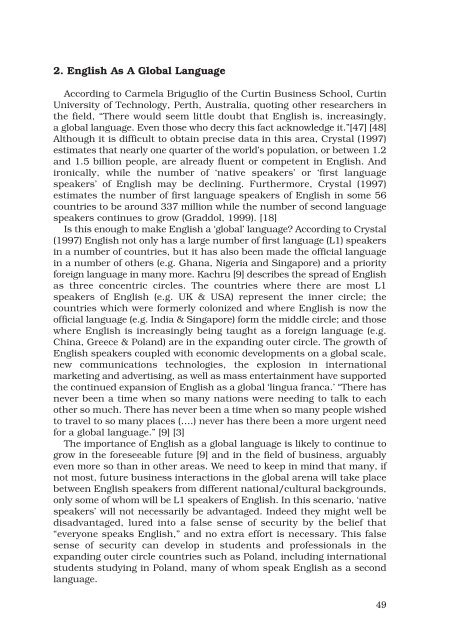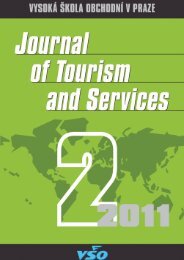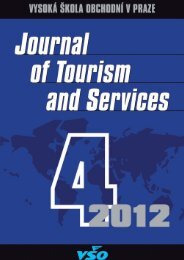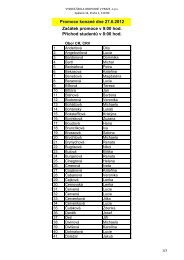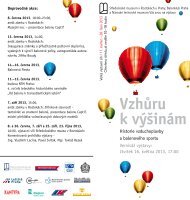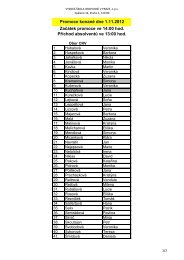Sestava 1 - Vysoká škola obchodnà v Praze
Sestava 1 - Vysoká škola obchodnà v Praze
Sestava 1 - Vysoká škola obchodnà v Praze
You also want an ePaper? Increase the reach of your titles
YUMPU automatically turns print PDFs into web optimized ePapers that Google loves.
2. English As A Global Language<br />
According to Carmela Briguglio of the Curtin Business School, Curtin<br />
University of Technology, Perth, Australia, quoting other researchers in<br />
the field, “There would seem little doubt that English is, increasingly,<br />
a global language. Even those who decry this fact acknowledge it.”[47] [48]<br />
Although it is difficult to obtain precise data in this area, Crystal (1997)<br />
estimates that nearly one quarter of the world’s population, or between 1.2<br />
and 1.5 billion people, are already fluent or competent in English. And<br />
ironically, while the number of ‘native speakers’ or ‘first language<br />
speakers’ of English may be declining. Furthermore, Crystal (1997)<br />
estimates the number of first language speakers of English in some 56<br />
countries to be around 337 million while the number of second language<br />
speakers continues to grow (Graddol, 1999). [18]<br />
Is this enough to make English a ‘global’ language According to Crystal<br />
(1997) English not only has a large number of first language (L1) speakers<br />
in a number of countries, but it has also been made the official language<br />
in a number of others (e.g. Ghana, Nigeria and Singapore) and a priority<br />
foreign language in many more. Kachru [9] describes the spread of English<br />
as three concentric circles. The countries where there are most L1<br />
speakers of English (e.g. UK & USA) represent the inner circle; the<br />
countries which were formerly colonized and where English is now the<br />
official language (e.g. India & Singapore) form the middle circle; and those<br />
where English is increasingly being taught as a foreign language (e.g.<br />
China, Greece & Poland) are in the expanding outer circle. The growth of<br />
English speakers coupled with economic developments on a global scale,<br />
new communications technologies, the explosion in international<br />
marketing and advertising, as well as mass entertainment have supported<br />
the continued expansion of English as a global ‘lingua franca.’ “There has<br />
never been a time when so many nations were needing to talk to each<br />
other so much. There has never been a time when so many people wished<br />
to travel to so many places (….) never has there been a more urgent need<br />
for a global language.” [9] [3]<br />
The importance of English as a global language is likely to continue to<br />
grow in the foreseeable future [9] and in the field of business, arguably<br />
even more so than in other areas. We need to keep in mind that many, if<br />
not most, future business interactions in the global arena will take place<br />
between English speakers from different national/cultural backgrounds,<br />
only some of whom will be L1 speakers of English. In this scenario, ‘native<br />
speakers’ will not necessarily be advantaged. Indeed they might well be<br />
disadvantaged, lured into a false sense of security by the belief that<br />
“everyone speaks English,” and no extra effort is necessary. This false<br />
sense of security can develop in students and professionals in the<br />
expanding outer circle countries such as Poland, including international<br />
students studying in Poland, many of whom speak English as a second<br />
language.<br />
49


